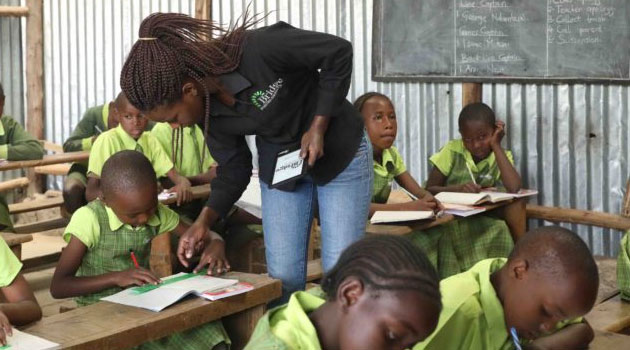
Bridge has schools in 44 counties and 194 constituencies in Kenya where it provides affordable education to disadvantaged children particularly in informal settlements. It is among a few schools in the country offering affordable education to children from poor backgrounds and marginalized communities. Photo/COURTESY.
The leaders, who include Kibra MP Ken Okoth, Chris Wamalwa of Kiminini and Murang’a County Woman Representative Sabina Chege, said stakeholder providing education alternatives to Kenyan children should be supported.
“Quality education for all our children in non-negotiable, it is an issue that all politicians in Kenya believe in. It is only a question of implementing it,” Okoth, the Kibra lawmaker said Friday at a consultative forum organised by Bridge International Academies at Ole Sereni Hotel in Nairobi.
The forum was attended by Bridge International Academies Board Director Greg Mauro, co-founders Jay Kimmelman and Dr Shannon May as well as former Information Communication Technology Permanent Secretary, Dr Bitange Ndemo as well as lawyer and constitutional expert P.L.O Lumumba who also served as the Chairman of the Ethics and Anti Corruption Commission.
“There will be competition and resistance from a number of people but we will put our children first and we will say that no Kenyan child should be left behind from that dream and vision that our Constitution has said,” Okoth, the Kibra MP said, and urged Bridge International Academies to set up schools in his constituencies, considered one of poorest in the country, and which he has helped transform greatly since being elected and is now seeking re-election while banking on his track record.
He said organizations involved in the Alternative Provision of Basic Education (APBET) should be supported in their quest to ensure that goal is achieved, adding that such schools should not be seen as a threat but rather as a partner in the education sector.
Okoth noted, with regret, the manner in which a few politicians had a tendency of politicizing matters that are critical to development, something that he said only served to the detriment of the nation’s aspirations for its future generation.
“Every child is entitled and has a right to a free and compulsory basic education. We must look for the funding of it; we have to look for the creativity to make it happen. All the APBET schools that are out there we want more providers to be inventing and so it’s not just a competition with government schools but it are a healthy competition and a choice for parents to decide,” he said adding: “If we’re racing up to the top that cannot be a bad thing.”
Sabina Chege, who heads the National Assembly’s Education Committee, too said there is need for more non-state actors to come in and support the Digital Literacy Programme which seeks to promote the use of technology in schools.
She said more private partners need to support government’s effort while applauding Bridge International Academies for being one such partner that has embraced technology in teaching.
“What I’ve seen with the transformation that has been brought by digital literacy in Kenya, I can only ask Bridge to come in so that we have not only public schools but public-private partnerships where we do not see you as a competitor or an enemy but as a friend who has helped in the transformation of the education sector in this country,” she said.
Bridge has schools in 44 counties and 194 constituencies in Kenya where it provides affordable education to disadvantaged children particularly in informal settlements. It is among a few schools in the country offering affordable education to children from poor backgrounds and marginalized communities.
“As the Education Committee, we support the children and we say every child has a potential. We want to nature our children and if you come in to support the education sector in our country we will not discriminate against you,” she affirmed.
Bridge Chief Executive Officer, Jay Kimmelman, said they are committed to continue investing more in technological infrastructure to ensure learners have access to advanced learning facilities.
“I am pleased that Bridge is an education partner in Kenya, building capacity and capability in education and technology. In the 21st century, technology has become an enabler of better schooling and development across the globe. Technology underpins the education provided by Bridge and there is no doubt that technology will play a pivotal role in empowering Kenyans over the next decade,’’ he said.
Bridge employs innovative technology learning gains in education through acting as an Education partner in Africa.
Following the Kenyan Government’s lead, other African Governments are working in partnership with Bridge because they hope to see the learning gains achieved by Bridge pupils in Kenya, replicated in their countries. In the 2015 KCPE, Bridge pupils achieved an average pass mark of 60% compared to the national average of 44%. In 2016, Bridge pupils achieved 59% compared to a national average of 44%. The longer a child is at Bridge the better they perform and in 2016 a child who had been at Bridge for 4 years achieved an average pass mark of 74%.
In May, Bridge was selected as partner to the Lagos state government, in Nigeria for a new education technology initiative, called CodeLagos. The programme aims to equip one million young people with coding skills and transform the state into a major technology hub over the next decade. Twenty-three Bridge academies and 3,000 pupils will take part in the initiative.
More than 100, 000 pupils have benefited from a Bridge education in Kenya and the schools continue to offer exemplary education options to parents who have low income and limited access but want their children to get quality education.









































